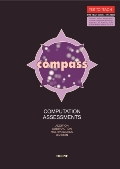COMPASS COMPUTATION ASSESSMENTS
Catherine Parkin
© 2003 Triune Initiatives NZ Ltd
PURPOSE
The COMPASS assessments are designed to test the knowledge and skills in the four computation areas (addition, subtraction, multiplication, division).
Each assessment is carefully designed to measure all the vital skills a student should know to be successful.The tests allow the administrator to identify the knowledge, skills and specific behaviours a student exhibits.
1 BOOK
12 computation assessments (addition, subtraction, multiplication, division).
Each skill targeted has suggested reasons for error to assist in analysis.
USED BY
specialists, classroom teachers, para-professionals and parents.
USED WITH
8 years - adult
SETTING
Individual or group
CONTENTS
Manual - includes Guide & Answers and 12 Copymasters
STRUCTURE
• 3 parallel tests for four computation areas (12 tests in total)
• Each item is one teaching step ahead of the preceding one
• Notes on observing behaviours & suggested reasons for error.
USE
• Primarily designed for one-to-one use.
• Can be used with groups and whole classes.
• The assessments are easy to administer, mark & analyse.
KEY FEATURES
• Photocopiable assessments for each computation area
• Graduated items covering all major skills
• Clear administration instructions
• A compilation of common errors that assessors may observe
• Definitions and examples of terminology used
• Guide to using the results
• Easy-to-read answers
• Photocopiable addition & multiplication charts
• Photocopiable record sheet
UNIQUE FEATURE
List of each skill targeted
with suggested reasons for error to assist in analysis.
RATIONALE
THE IMPORTANCE OF
COMPUTATIONAL SKILLSAlthough the calculator is a valuable and welcome tool to aid accuracy and speed of mathematical calculations, basic computation knowledge and skills remain important for estimation and more complex mathematics. They are also important as a manual ‘back-up system’.
To help those who struggle to understand the skills of computation you must isolate the problems before you can intervene.
Good analysis is critical
to effective teaching.

